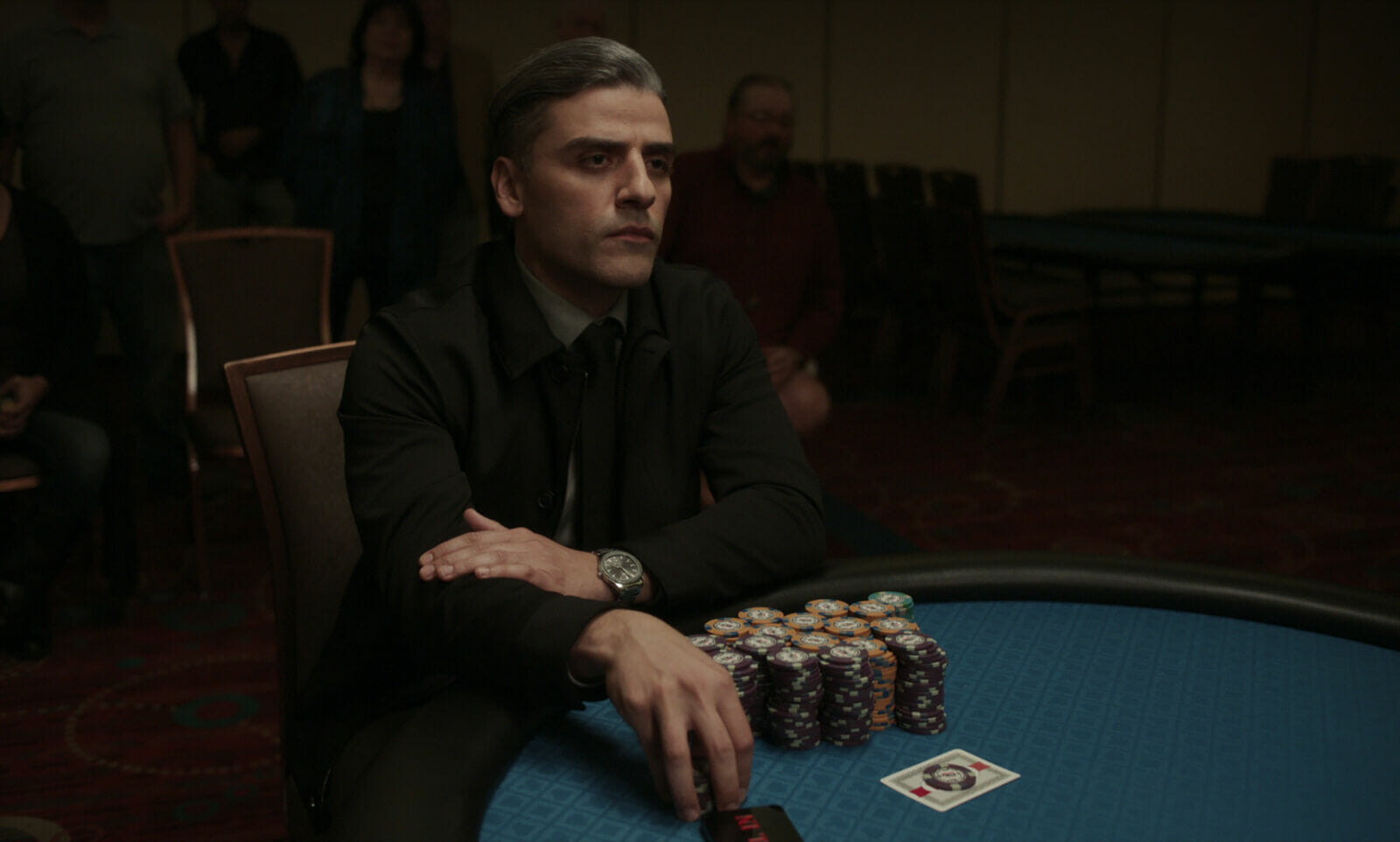The Card Counter comes to us from esteemed filmmaker Paul Schrader, writer of Taxi Driver, director of First Reformed, and more recently, avid Facebook poster. Schrader’s additions to the cinematic canon are nothing short of legendary, but his Facebook output—stray thoughts on everything from classic films to, uh, the difficulty of not touching beautiful women in his employ—has caused concern for Focus Features, the studio distributing The Card Counter. They even mandated a freeze on his posting for the time being. His latest film, then, is where you should go to find out what’s on his mind. Question is, do you want to listen?
The uncomfortable truth is that Schrader—a white American man who makes movies about the threat of white American men (or, rather, about the world that turns these men into threats)—has always felt a connection to his disturbed protagonists. Another uncomfortable truth is that his struggle with toxic masculinity doesn’t necessarily make his art toxic. He wrote Taxi Driver while broke, porn-addicted, and bitter at his own loneliness, but the film is hardly an incel screed. Martin Scorsese, who directed from Schrader’s script, once called Taxi Driver “my feminist film”, as its depiction of the cost of masculinity could be read as a warning. Art works in inverses and multitudes: an incurably sexist protagonist written by a maladjusted man does not a misogynistic movie make. And thank god for that, or else The Card Counter would be the year’s most heinous release.
READ ALSO: Review: Rebecca Hall lifts ‘The Night House’
The film stars Oscar Isaac as the cheekily named William Tell, a career gambler who games poker and blackjack tables across the country. He keeps a low profile, quitting when his winnings are modest and spending his nights in cheap motel rooms. He also likes to strip these motel rooms bare and wrap all their furniture in sheets and twine, turning them into self-made prison cells of sheer austerity. He’s a strange man with even stranger neuroses. It all ties back to his previous job: enhanced interrogator in Abu Ghraib, Iraq. In other words, he tortured people for a government that was lying to his face.
It’s a raw, difficult subject, and Schrader wisely switches up his style to honor that. His previous film First Reformed was shot in transcendental style—a method of filmmaking that Schrader literally wrote the book on—which uses lengthy, motionless, meditative shots to stress the monotony of life, making it all the more powerful when a transcendent force breaks through the gloom. It’s a style that lends itself well to spiritual films. The Card Counter is concerned with the spiritual, but it’s too buried in the muck of human vice to fit a transcendental approach. Torture isn’t something to meditate on. Instead, the cinematography is lurid, dark, and almost voyeuristic, lurking around corners to show us what no one should see. During flashbacks to Abu Ghraib, the camera adopts an extreme fisheye lens, visualizing the essence of the military prison: warped.
The score, too, is skin-crawling and oppressive. Featuring original compositions from Black Rebel Motorcycle Club vocalist Robert Been, the score is swirling with deep sighs, heavy bass, and the repetition of haunting phrases. It’s grungy as hell. And hell is always close by: at the peak of a magnificent performance, Isaac describes the sights, sounds, and smells of the Abu Ghraib operation, and you can feel the weeping and gnashing of teeth in his shuddering body; you can see it in his dead eyes. Torture begets torture.
How does gambling fit into this? Metaphorically, mostly. Schrader uses the world of organized gambling—players, backers, betters, scouts—as an allegorical canvas for the American machine. Some metaphors are more obvious than others, like the poker player who dresses in American flag apparel and wins every game, but others are more carefully coded. Paramount to the allegory is the relationship between “tilting”—in poker terms, losing your mental balance and slipping up—and the debt it incurs.
Schrader’s more interested in the metaphorical potential of card games than in card games themselves, so the lengths of time in which poker games play out are the film’s least interesting—though they are spiced up by dark humor. Isaac’s chemistry with Tiffany Haddish, who plays a gambling financier, keeps the games from wilting as well. From a pacing perspective, rounds of poker seem like opportunities to let the tension simmer, but they feel more like breaks from tension: the relent of an unrelenting mood. Interruptions in tone are more common here than in Schrader’s other work. Whether it’s out-of-touch dialogue (“have you heard of Google Earth?”) or lower-key scenes going on a little long, The Card Counter isn’t as tight as Schrader’s best films.
But it’s still potent—pungent, really, with the stench of a country that plays games with people’s lives. To The Card Counter, there’s no American experiment without tilt. Someone has to lose it—their mind, their money, or their life—for someone else to profit. Thus, the country was set up at an angle, giving those at the top the protection and power of the house. The film runs over with that viscous pessimism. But as with Schrader’s First Reformed, it implies a glimmer of hope, one with theological import: if we inherit our debt, our sin, not from Adam but from America, then our souls aren’t the problem. We’re products of our environment, not fallen creations. Hell isn’t where the bad men go—it’s where they come from. And maybe they can put the flames behind them.
★★★★ (4/5)




